You can use this LCD Custom Char Builder Software to quickly and easily build custom characters for alphanumeric LCD modules.
LCD Custom Char Maker |
A standard alphanumeric LCD module supports eight custom characters. So our software has view for all eight custom chars named from Char 0 to Char7. You can select any char to edit at a time.
Select a char to edit … |
You can use your mouse to draw the character in the large green area as shown above. Holding right mouse button erases the pixel. In the example below we have drawn a "Heart" symbol for custom Char 1.
Draw the char using mouse. |
Now we have completed drawing all the eight custom characters.
Draw all 8 characters. |
Finally HIT Save code to get a custom_char.h file. This header file is compatible with our popular LCD interface library. You just need to copy/paste this header file in your lcd project folder. Then edit the lcd.c (part of our library) to include this file.
Outputting a custom char on LCD is fairly easy! Say for example if you need to write.
"I ♥ AVR"
write the code like this :-
LCDWriteString("I %2 AVR"); The %2 will be replaced by the custom Custom Char 2 which is defined as a heart symbol in our header file generated above.
For more details on the above function i.e. LCDWriteString refer to the Tutorial given below.
Downloads
- Download LCD Custom Character Builder !
Author
Avinash Gupta
Facing problem with your embedded, electronics or robotics project? We are here to help!
Post a help request.

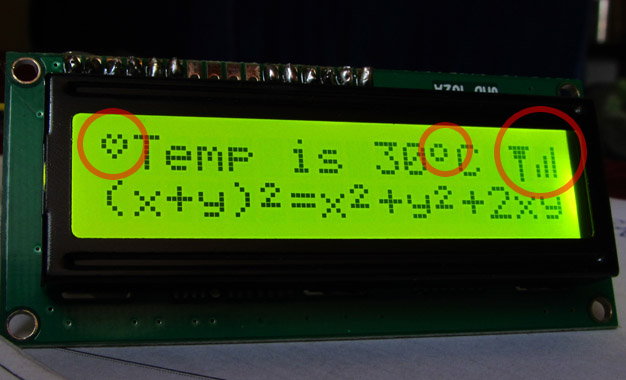
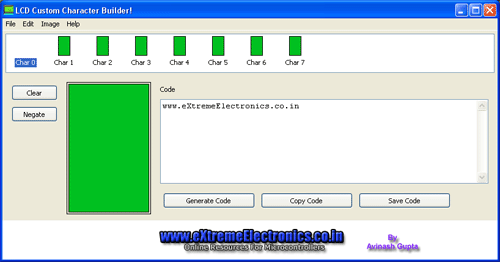
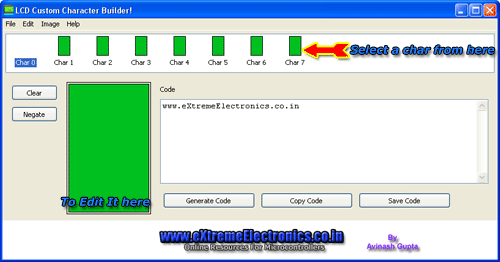
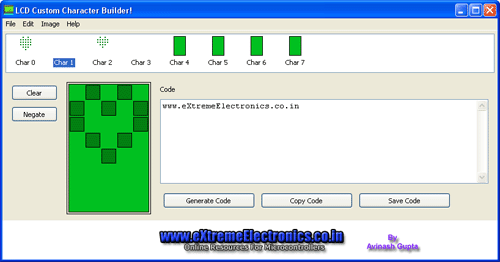
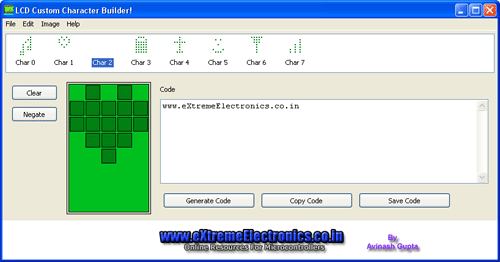



Pingback: Using LCD Module with AVRs | eXtreme Electronics
Good idea! Nice piece of software.. Works well on Win 7. Small and light.. 🙂
Well done
Very interesting information. I have several alphanumerical single displays I would like to use individually. I need a simple circuit to display characters on a single display to familiarize myself to the process. The display I want to use is DLO 7135 a 5 x 7 14 pin display. Thanks for any suggestions. Regards, George
Great Idea !
Is it possible to make more than 8 characters?
Create 2 files a and make from them only one file with 16 characters….
Or is it restricted by LCD driver ?
I have tried it, but my idea was wrong.
It´s not working.
nice software i useed the generated code and modified it to be used for avr codevisinon compiler in the following link
http://all-about-embedded.blogspot.com/2012/08/displaying-custom-charactors-on-lcd.html
I have a problem with it. when i write code for 8th character in custom_char.h file it gives error in output means 8th character is not displaying as i developed it.
Can we use your lcd library for lcd interfacing with pic16f72…..?????????? If yes what are the changes in header file or how to use it?????? If possible please upload lcd liabrary for pic16f72…….
Thank you.:)
@Pradip,
Please behave like an educated guy ! Putting ten question marks after a question only indicates that we need to attend grammar classed first!
No this library does NOT work for PIC16F72
Extremely sorry sir for my mistake.Any solution for this? because this is a good library for programming LCDs.
The LCD Custom Character Builder software is very useful. Can u please tell which language you have used to write this software/GUI. Thanks
c language
Hello Mandeep,
Thanks for the answer. Can you please tell how do we create a GUI as shown in the app.
really good work sir.
after generating the header file custom_char.h
and including it in the main project file what changes i have to do in lcd.h and lcd.c?
can anyone plzzz help me out with all the steps …!!
and i m new in this field of microcontrollers.
Please correct the spelling of “please” in above comment or will be deleted by next day … 🙁
i m really sorry about that sir.
@Mayur,
Everything is written in the above tutorial? Do you think anything is omitted ?
after generating the header file custom_char.h
and including it in the main project file what changes i have to do in lcd.h and lcd.c?
can anyone plzzz help me out with all the steps …!!
i like ur work..
Can you tell me how to show battery level on lcd??
@sahib,
how do you think it should be done?
I did all the steps. After writing ,still in output %2 only showing no any custom character. Please help me.
after writing this LCDWriteString(“I %1 AVR”);
Even showing %1 for above statement.
You are using old version of the LCD library.
Can you please give me new version lcd header file. And how do we know custom character value,
Like ? =%2. Please help me.
GOOD……
sir can you make a he file for lcd with avr , which is fully customized manner. where i can find all the functions. plz send me on my mail id for my college project.plz help me…
smrutiranjanpanda222@gmail.com